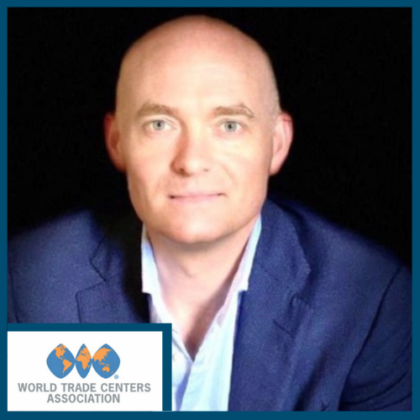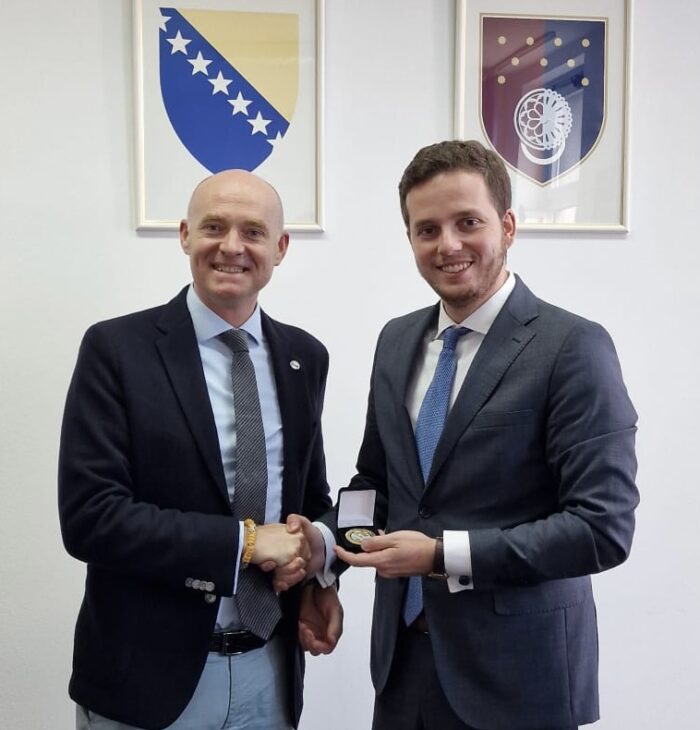We caught up with Robin van Puyenbroeck, who has served as Executive Director for Business Development at the World Trade Centers Association following a successful search with Development Guild DDI in 2020. He discussed how his role has evolved since joining and his work serving on nonprofit boards.
When we first spoke, we asked what brought you to Executive Director of Business Development at World Trade Centers Association. Now, we’d love to hear about your greatest achievements since joining.

Overall, the World Trade Centers Association has achieved a lot, and this is due to a phenomenal team effort. It always takes a village, especially coming out of COVID, and with that village we managed to build an amazing global team. We are also very lucky to have an active and engaged Board of Directors that really drives our progress.
Within Business Development, my sphere in the organization, I want to highlight two specific achievements. Right now, our growth story is a real priority. Thus far, our team has been able to hit, or even surpass, targets since I started in 2020. We are currently aiming to grow our license memberships from 320 to 500, or 56%, which is a very ambitious goal. And now, with this goal and our team, this growth will continue to accelerate even further.
I also wanted to touch on our pivot to Africa year, built around our global business forum, WTCA’s General Assembly, which took place in Accra, Ghana in April of 2023 and for which we partnered with Afreximbank as a main sponsor. Our focus for 2023 has been to pour energy into important economic and organizational growth markets including in Africa. Instead of just holding our General Assembly in Ghana, we decided to dedicate the whole year as a pivot to Africa and significant efforts to grow our presence and engagement on the continent.
Our work across Africa is closely related to our mission, which is to stimulate trade and investment opportunities and support businesses looking to connect globally and prosper locally. This is really a story of critical infrastructure on the continent, not just about physical infrastructure. We see interconnected business networks as a piece of critical infrastructure on all continents. This concept resonated because it makes sense and as a result gained tremendous media coverage including major prime time business shows on CNBC Africa and NASDAQ. It makes us relevant. If businesses cannot find each other, then trade cannot develop.
You joined the World Trade Centers Association in 2020, right at the beginning of the Pandemic. How has your work and role changed three years out from the Pandemic?
COVID was such a unique experience. I joined WTCA in 2020, at the height of the pandemic, and it took a year before I could meet my team members in person. So, of course, the role evolved. As I mentioned, my focus is now primarily on the growth story, including our partnerships, which is very strongly linked to our public relations effort to share the message. When I first started, my work was focused on a broader range of responsibilities, and much of that has now gone to others that have stepped up and are doing a great job at it.
In your international experience, where are some of the geographic areas with the best economic investment opportunities?
That’s the million-dollar question. From the perspective of WTCA, we really see growth in countries like Brazil, Mexico, India, and of course across the continent of Africa. Africa is one of those growth stories that will take some more time, but you cannot beat the demographics—there is something amazing happening there.
Next year, our Global Business Forum will be in Bangalore, India. We are focusing on how we can make our pivot to India and fully leverage that work. Our approach will of course be different than that in Africa—comparing a country to a whole continent. As a side note, we changed the concept and name of our annual meeting from General Assembly to Global Business Forum. We really want to focus not just on bringing our World Trade Centers to this annual event, but to encourage WTCs to bring their business partners and create a space to conduct business. So that will be a critical priority for the meeting in India, and again that goes back to our mission: to create and facilitate trade and development.
You were recently appointed Co-Chair of the Advisory Council on Small Business of the Export-Import Bank of the United States, and serve on the Board of the UN Association of NY, among other board positions. What drew you to these opportunities?

Robin van Puyenbroeck with Prime Minister Nihad Uk in Sarajevo, Bosnia and Herzegovina, August 2023
It was a great honor to be invited and appointed by the chair of the bank to this position. The engagement is relevant to my own work and is stimulating trade for small and medium enterprises. It allows me to leverage my banking background and network in international affairs.
With the United Nations Association of New York, I have served on the board for almost 15 years. What drew me there was the engagement and education aspect. The mandate of the UNA is to educate the American public about the work of the United Nations. For me, it’s also about being involved in promoting the values of the United Nations. It’s about making the world a better place. We created a global Scholars Program sending young graduates abroad for internships with U.N. agencies, we host an annual U.N. Day Gala dinner, and we of course do a lot of events, like talks with ambassadors, U.N. officials, etc.
The education aspect, is also what drew me to EUCLID, which is a university. EUCLID is focused on providing educational and graduate programs to diplomats and the general public mainly in developing countries. In that same vein, I also serve on the board of the Dutch School here in the U.S., the largest Dutch language school outside of the Benelux. I am a native Flemish-Dutch speaker, so I care about the continuing practice of the language, especially in young people, it is part of our cultural heritage.
Really what has drawn me to these various boards is their connection to education and to international relations, be it UNA that is focused on educating people about the work of the United Nations or Euclid that is really more focused on higher education and international affairs, but also leadership in developing countries.
What advice would you give to anyone looking to join a board?
You have to be passionate about, or at least be interested in, the mission and values of the organization. You also need to consider your expertise and where you can be helpful with outside-of-the-box thinking, even beyond your specific sector. It is important to create a group that can bring in different perspectives.
Nonprofit boards are volunteer based, so it’s also important to make sure you have ability and willingness to contribute, be it your time, your expertise, or your network.
Beyond being passionate and committing time and knowledge to the work, I believe you also need to be informed about geopolitical matters. Now more than ever, a good board candidate needs to have a deep understanding of geopolitical context, of what’s going on in the world because these organizations do not exist in a vacuum.

